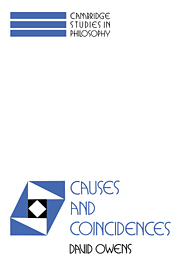Book contents
- Frontmatter
- Contents
- Preface
- Introduction
- 1 THE INEXPLICABILITY OF A COINCIDENCE
- 2 CAUSES AND LAWS
- 3 EVENTS AND NON–CAUSAL EXPLANATIONS
- 4 CAUSAL EXPLANATION
- 5 THE DIRECTION OF CAUSAL EXPLANATION
- 6 LEVELS OF CAUSATION
- 7 DEVIANT CAUSAL CHAINS
- 8 CAUSATION IN ACTION
- Conclusion: WHITHER CAUSAL REALISM?
- Bibliography
- Index
3 - EVENTS AND NON–CAUSAL EXPLANATIONS
Published online by Cambridge University Press: 14 October 2009
- Frontmatter
- Contents
- Preface
- Introduction
- 1 THE INEXPLICABILITY OF A COINCIDENCE
- 2 CAUSES AND LAWS
- 3 EVENTS AND NON–CAUSAL EXPLANATIONS
- 4 CAUSAL EXPLANATION
- 5 THE DIRECTION OF CAUSAL EXPLANATION
- 6 LEVELS OF CAUSATION
- 7 DEVIANT CAUSAL CHAINS
- 8 CAUSATION IN ACTION
- Conclusion: WHITHER CAUSAL REALISM?
- Bibliography
- Index
Summary
The task before us is to draw a line between causal and non-causal explanations, between the explanations delivered by natural science and those arising out of our non-scientific logical, legal and linguistic practices. Since I believe that causal facts can be reduced to non-causal facts, and in particular to relationships of necessity and sufficiency between events, we must find the source of this division in some further difference among these underlying relations. In chapter 2, I decided there was no way of establishing that the relations themselves differed in their metaphysical status: connections established by natural law might be no more contingent than those engendered by language, logic or the civil law. Now we must ask whether some other feature of their relata, present in one case and absent in the other, can do what is required.
According to Hume
(3) A cause must be distinct from its effect.
He may have intended this as no more than an alternative formulation of the other two theses I attributed to him in the previous chapter:
(1) causes are contingently sufficient for their effects.
(2) causal connections are discoverable only a posteriori.
However, modern philosophers such as Davidson and Lewis, who treat causes and effects as objects, have construed (3) as a further constraint on causation, telling us that causes are neither identical with, nor a part of, their effects. And nothing I have said so far touches on this requirement of distinctness.
Information
- Type
- Chapter
- Information
- Causes and Coincidences , pp. 41 - 62Publisher: Cambridge University PressPrint publication year: 1992
